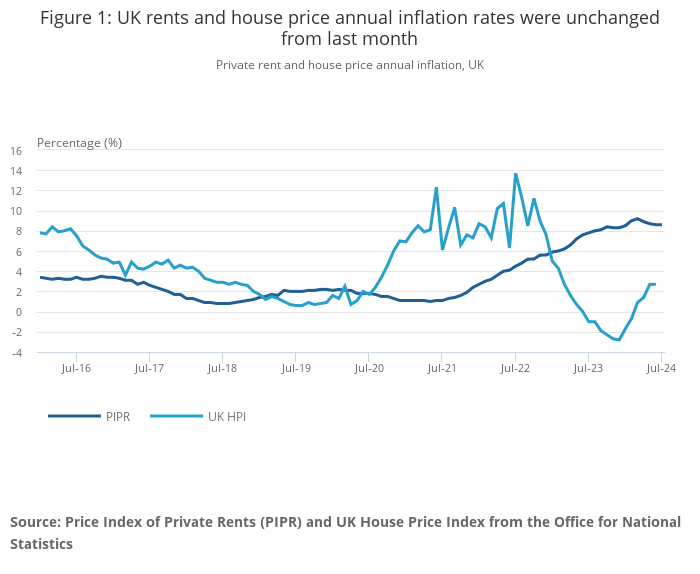Rising London rents are ‘a pressure cooker ready to explode’ as home ownership ‘inching out of reach’

“A pressure cooker ready to explode” is how one expert has described the current situation in the UK housing market as data showed rents jumped close to 10 per cent in London over the past year.
In fresh data released this morning it was revealed that average UK private rents increased by 8.6 per cent in the 12 months to July 2024, while rents in London increased by 9.7 per cent to £2,114 per month, according to the ONS.
The average UK house price only rose by 2.7 per cent, with the largest rise in Yorkshire – of 4.7 per cent – and the smallest in London – of 0.6 per cent.

Andrew Montlake, Managing Director at Coreco, a leading mortgage broker said: “The resilience of the property market over the past year has been notable.
The double-digit price falls many predicted simply haven’t materialised…. the property market had different plans.”
Houses in London might not be getting more expensive, but high rents have put the housing ladder increasingly out of reach for many.
A tough market for renters
“While house prices are holding up fairly well, the real pain is being felt by tenants due to soaring rental costs,” Patricia McGirr, Founder of Repossession Rescue Network, said.
“For those already teetering on the edge financially, this is more than just an increase, it’s a pressure cooker ready to explode… Families are being squeezed from all sides,” McGirr said.
“House prices are inching out of reach for many, and rents are escalating to unsustainable levels. It’s a cruel irony that the roof over your head is becoming a financial burden too heavy to bear for many,” she added. “It’s a social crisis in the making.”
Daniel Hobbs, Managing Director at New Leaf Distribution, said: “Many tenants are in a vice-like grip meaning it’s harder for them to save for a deposit.
While there are regional variations, the overall trend is clear: the cost of housing, whether buying or renting, remains a significant financial burden for many. But at least, with mortgage rates edging down, affordability is improving slightly…. that’s good news for borrowers,” Hobbs added.
Rents in the capital have risen by around 37 per cent since the pandemic, according to data from the ONS and Savills.
Pressures on housing demand
Part of the reason rental prices have risen is pressure on housing demand; house building in the UK was at its lowest since records began in June.
While Labour has pledged to build 1.5m homes to bridge the gap in supply, it is uncertain whether they will achieve their goal.
“The Government’s renewed focus on revitalising the construction sector—through ambitious housebuilding targets and more efficient planning processes—should help to boost the supply of high-quality rental stock, which is a positive development for the market,” Emma Cox, managing director of Real Estate at Shawbrook, said.
However, Brian Byrnes, head of personal finance at Moneybox, said the UK will need more than just homes to ease the pressure on housing.
“The measures needed to address the housing crisis are many and complex,” Byrnes said.
It remains true that saving a sufficient deposit is one of the biggest challenges many people face and this is why pragmatic measures are needed now.
“[But] with a new government committed to supporting wealth generation across the country, perhaps there is a glimmer of hope for aspiring homeowners in the UK,” he added.
Are the figures dated already?
The Bank of England cut the interest rate by 0.5 per cent in August. This has already had a knock-on effect on the mortgage market. Borrowing costs have fallen below four per cent in some cases, which is bound to have an impact on property prices.
However, the ONS data only covers the twelve months to July this year.
Amy Reynolds, head of sales at Richmond estate agency Antony Roberts, said: “These figures, which show prices rising again, are authoritative if a little dated. On the ground, we’ve had a really busy August and it’s hard to say definitively whether this is a result of the recent base rate drop but a big coincidence if it isn’t.
“We are agreeing sales in all price ranges. We are not seeing a high number of viewings as many people are away on holiday but that means the quality of the viewer has improved and they are more inclined to be decisive.
“Sentiment is positive and people are hedging their bets that rates will drop further this year and next, persuading them to take action now and opt for a base-rate tracker mortgage in order to take advantage of future rate cuts.”
Mark Harris, chief executive of mortgage broker SPF Private Clients, added: “The first rate cut since the pandemic has been well received and sends out an important message that rates have peaked and are on a downwards trajectory.
“How fast those further rate reductions come will depend on the state of the economy and inflationary pressures.”
